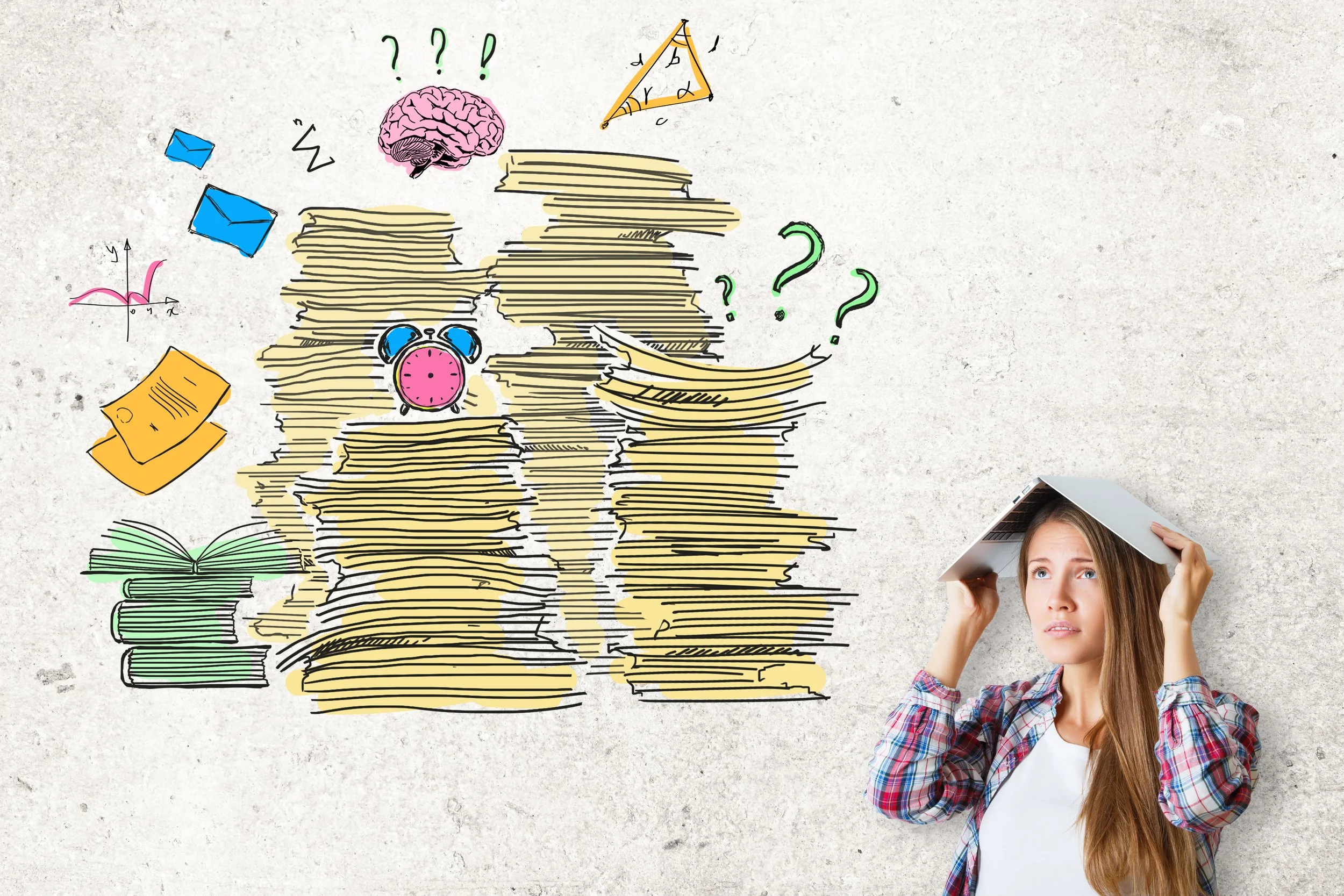Procrastination: Not All Bad, Not All the TIme
When Ernest Hemingway was asked how to write a novel, he responded: “First you defrost the refrigerator.”
If you've ever struggled with procrastination, you probably get the humor in Hemingway's advice, even if today's frost-free refrigerators make defrosting a thing of the past.
While cleaning out the 'fridge may not be your first choice when faced with a task you'd rather not do, you may have found yourself taking one of these common detours instead:
surfing the web for news
scrolling through social media
cleaning out your closet
video gaming
washing the floor
folding laundry
going grocery shopping
reading
binge-watching a new streaming series
sorting papers to recycle or shred piles
catching up with friends
playing with your kids
washing the dishes
tidying up common areas
There's no question that detours like these can be useful or entertaining, but when you have more important or urgent stuff to do, even useful activities can produce negative outcomes of sub-par performance and increasing amounts of stress.
These “useful” activities trick us into feeling productive, but as we fall farther behind on more important tasks, it’s easy to become consumed with self-doubt and feelings of guilt.
Not only that, our pessimistic outlook increases the chance of failure and may even contribute to depression. Serious procrastination drives up the likelihood that we give up totally and fail to complete tasks.
That's because once we begin to procrastinate, the "what the hell" effect may get activated.
How the What the Hell Effect Can Lead Us Down the Path to Failure
The "what the hell" effect?
It's a real phenomenon!
Defined by diet researchers at the University of Toronto, it describes a vicious cycle of indulgence, regret or shame, more indulgence, more regret or shame, etc.
Say you’re on a strict diet and succumb to the seductive smells of a fresh pizza or bubbling apple pie. You have a piece even though you promised yourself that you wouldn’t.
Recognizing that you've strayed, you feel bad. And you feel defeated.
So, you end up saying to yourself, "I screwed up and blew my diet, so what-the-hell . . . I may as well have another piece."
You have another piece . . . and another. Before long, you've eaten half the pizza or a huge hunk of pie.
That's the "what the hell" effect.
Recognize that pattern? Ever had it happen to you with the pizza or pie? Or maybe it was chips or ice cream? Just as easily, it could be binge-watching the latest streaming series or suddenly noticing the sun coming up because you spent the whole night battling Pyramid Head or Elder Dragon.
It begins when we become too anxious and overwhelmed to get started on the target task. We get paralyzed by inaction as we get sucked into other activities. We become passive participants in behaviors that take us far away from our more critical goal.
If this all sounds pretty grim, that's the problem with procrastination: It can lead to a lot of distress and trouble.
We’ll show you how to combat and overcome the what-the-hell effect in another blog.
But for now, let’s take a look at another form of procrastination that doesn't get talked about very much. But it deserves to be.
That's active procrastination.
How Can Procrastination Be Good for You?
We started with a quote from Ernest Hemingway, so let's stick with writers.
Everyone knows about "writer's block," right? If there's one endeavor that seems fraught with procrastination, it's writing.
But there's a deeper way to understand the sometimes circuitous route people take on the journey to getting things done.
Turns out that many writers, even the best, use procrastination in quite a different way than what we've been describing above.
What we described above is the classic form of procrastination. It's called passive procrastination. We shove aside what we're supposed to and fall passive victims to and participants in other activities that consume us.
Many writers however, actively procrastinate.
They take detours and make stops along the way toward their writing goals . . . but with the full intention of returning to their writing more energized, in a clearer frame of mind, and better equipped to carry out the necessary writing tasks.
As Agatha Christie said: "The best time for planning a book is while you're doing the dishes."
Active procrastinators put off doing stuff to the same degree as passive procrastinators. But the comparison stops there.
What researchers have found is that active procrastinators are more similar to non-procrastinators than to passive procrastinators in several ways because active procrastinators:
make deliberate decisions to delay
take control of and make purposeful use of time
are confident and have a strong belief in their self-efficacy
manage challenges with effective coping strategies
work well under pressure of upcoming deadlines
experience less stress
have an increased tendency to be in a flow state while working
produce the desired outcomes that pleases them, even if they may rush through it at the end
When asked about the ideal way to get a job done, most people respond by talking about setting goals, defining incremental milestones, and making steady progress until they reach the ultimate goal.
But steady progress isn't necessarily the only way to reach the ultimate goal.
Active procrastination (that is, deliberating delaying progress toward a goal) can play an important role in delivering great results.
Talking about the creativity that goes into fine-art painting as an example, Timothy Pychyl, Canadian psychologist warns, “. . . if we try to say that anything but brush to canvas is procrastination, then we’re undermining what it is to be creative . . . don’t call every delay or every sort of inaction, procrastination.”
Active Procrastination Delivers the Goods
Writer Richard Ford said this in 1999 about deliberately delaying:
"Writing can be complicated, exhausting, isolating, abstracting, boring, dulling, briefly exhilarating; it can be made to be grueling and demoralizing . . . If you're a writer, you can stop anywhere, any time, and no one will care or ever know. Plus, the results might be better if you do."
Stopping is usually not what we think of as something that helps us progress.
But here's how a deliberate delay helps writer Neil Gaiman:
“I’ll write a first draft . . . And then, if I can, I’ll put it away for a week or two. Not look at it. Try to forget about it. Then take it out and read it as if I’ve never seen it before and had nothing to do with its creation. Things that are broken become very obvious suddenly . . . I’ll fix what I find."
For Ford and Gaiman, deliberately delaying progress by taking a break offers a fresh start with greater clarity and refocused attention.
But not all active procrastination involves taking a break.
Strategic Daydreaming: One Way to Make Active Procrastination Work for You
When we think about Agatha Christie's "best time to plan a book is while doing the dishes,” we see that active procrastination can take many forms, from taking a break to engaging in what some experts call strategic daydreaming.
Strategic daydreaming is letting your mind wander so that problem-solving, creativity, future planning, and seeing things from multiple perspectives has the space to blossom.
The benefits of strategic daydreaming are numerous because it:
recharges your brain
refuels your brain
boosts memory power
When strategic daydreaming is the form your procrastination takes, it can enable you to be productive while you live important values unrelated to your productivity.
Here's what writer Tina Chang has to say about her own process and the deliberate choices she's made to live her values as a mom and as a professional poet:
"My process has changed tremendously since I’ve had my children. I once had long, languid days that unfurled in one fluid gesture of creation. At night, I shared my ideas with other writers or friends and that would give life to other poems.
These days, after I have fed, napped, entertained, bathed, changed, and put my children to bed, I have my dinner, put on my shoes, and head to the rented office around the corner.
Nowadays, my creativity is summoned within a two-hour time span. In this way, my writing has become more efficient. I will keep mental notes during the day as I run around playgrounds and do the laundry. Those notes will then find their way into poems by evening. I then type furiously. The objective is to keep my hands moving and if my hands are moving my mind is working."
Although most procrastination is passive and leads to a lot of stress and negative outcomes, active procrastination can be an antidote when your productivity is suffering because you're tied up in knots and feel like you're banging your head against the wall.
We’ll get back to active procrastination and strategic daydreaming in another blog. But right now, we invite you to take a first–and important–step to tackle your own unique problems with procrastination by developing a personalized procrastination profile. CLICK HERE to begin.
Read the other articles in the Be Your Own Best Coach series on getting things done without procrastination:
Get Things Done Without Procrastinating
Get Things Done Without Procrastinating gives you everything you need to take a big step toward crushing procrastination. Instead of being filled with stress, anxiousness, or nauseating dread, you can face each stressor, regardless of the kind, with a sense of possibility and optimism.


